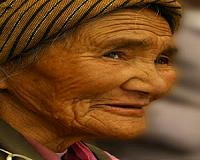| . |  |
. |
Beijing (AFP) July 4, 2010 China's population will near 1.4 billion by 2015, when over half of the nation will be considered urban dwellers, state press said Sunday. China's urban population will rise to over 700 million people by 2015 when city dwellers outstrip the rural population for the first time, Xinhua news agency said, citing Li Bin, head of the nation's population planning agency. Over the next five-years, as the rural population leaves the countryside for the urban industrial centres, China's population will undergo several other major changes as it surpasses 1.39 billion people, Li said. During the period, China will witness its first ageing-population boom, with an average of about eight million people turning 60 each year, up from an average of around 4.8 million from 2006-2010, she said. By 2015, China will have 200 million people over 60 years of age, Li told a population symposium in Nanjing city. Meanwhile, the proportion of the population aged between 15 and 59 -- the working age group -- will peak and then slowly begin to fall, the report said. According to official statistics, China's population stood at 1.32 billion at the end of 2008, about 2.5 times the number in 1949. when the People's Republic of China was founded, Xinhua said. China implemented a strict population control policy in 1979, generally limiting families to one child, with some exceptions for rural farmers, ethnic minorities and other groups. The government maintains that the policy has averted 400 million births and has vowed to enforce it until at least 2033, when the population is expected to peak at 1.5 billion people.
earlier related report The study at Boston University identified a small set of DNA variations called genetic markers that can predict "exceptional longevity" with 77 percent accuracy, the Los Angeles Times reported Friday. There's no one single "longevity gene," the study published in the journal Science said, but rather a cumulative effect of almost 150 markers, and different people show different markers. "The study shows that there are different paths to becoming a centenarian," BU graduate student and co-author Nadia Solovieff said. "People age in different ways." Genes are not the whole story, the study said. For most people, environment and lifestyle play equally important roles in aging. Research on the genetic markers could be used to develop drugs for age-related diseases such as heart disease, diabetes and Alzheimer's, which occur at much lower rates in centenarians, the study suggests. Centenarians, people 100 or older, account for about one out of every 6,000 people in the United States, where the average life expectancy is about 78 years,. "It's kind of like winning the lottery," study co-author Dr. Thomas Perls said.
Share This Article With Planet Earth
Related Links All About Human Beings and How We Got To Be Here
 Genetic markers can predict longevity
Genetic markers can predict longevityBoston (UPI) Jul 2, 2010 Genes can accurately predict how long a person will live, and they may provide clues to treat or prevent age-related diseases, a study says. The study at Boston University identified a small set of DNA variations called genetic markers that can predict "exceptional longevity" with 77 percent accuracy, the Los Angeles Times reported Friday. There's no one single "longevity gene," ... read more |
|
| The content herein, unless otherwise known to be public domain, are Copyright 1995-2010 - SpaceDaily. AFP and UPI Wire Stories are copyright Agence France-Presse and United Press International. ESA Portal Reports are copyright European Space Agency. All NASA sourced material is public domain. Additional copyrights may apply in whole or part to other bona fide parties. Advertising does not imply endorsement,agreement or approval of any opinions, statements or information provided by SpaceDaily on any Web page published or hosted by SpaceDaily. Privacy Statement |